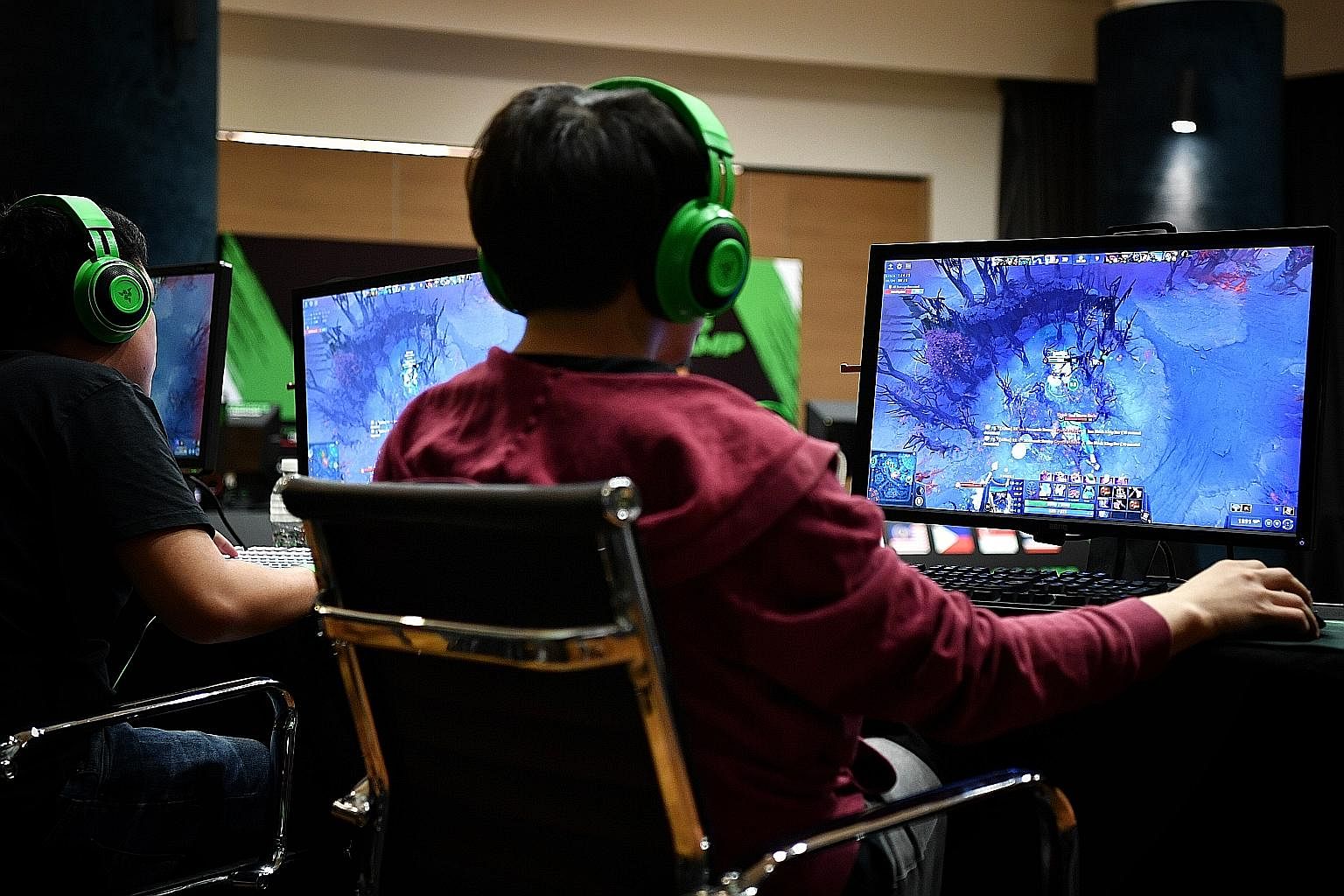A few years from now, people may look back at 2020, the year of Covid-19, and wonder if it was the decisive point in the social acceptance of e-sports as a form of mainstream entertainment.
After all, e-sports became the only game in town for months when the rest of professional sports and much of live entertainment were forced into a hiatus by sweeping restrictions on travel and large-scale gatherings imposed by countries around the world.
With record numbers of people under lockdown and cooped up at home, e-sports also had a captive audience with a record demand for video games such as Dota 2 and Fortnite that, like most sports, requires teamwork and strategy.
United States video game sales in March alone amounted to almost US$1.6 billion (S$2.24 billion) according to market researchers NPD Group, a 35 per cent increase from the same period last year.
E-SPORTS V SPORTS AND VIDEO GAMES
E-sports today can be best defined as competitive video gaming with some elements of professional sports layered on top.
The lines between e-sports and playing video games are quite often blurred for good reason because there is no getting away from the fact that e-sports involves playing a lot of video games.
But they are not exactly the same thing. For one, e-sports require there to be some form of organised competition with other players.
Not all video games include this element. Many games feature single-player or cooperative modes, while many gamers prefer not to compete against others.
For example, a player who spends hours designing his perfect island paradise in the popular social simulation game Animal Crossing to show off to friends cannot be said to be participating in e-sports.
As the e-sports industry continues to professionalise, there is also an increasing separation between e-sports professionals who play for a living and casual players who play for fun.
E-sports pros are more like their professional counterparts in traditional sports today than the average gamer.
To reach the levels of performance that will earn them the increasing sums of prize money at tournaments, and the lucrative attention of sponsors that follows, e-sports pros train around 50 hours a week, with drills, video analysis and practice matches on the schedule.
To put it another way, the winning five-man Dota 2 team at last year's The International, the most lucrative tournament in e-sports, did not win $15 million by playing games for fun.

-
About The Big Quiz
-

On Mondays, for 12 weeks until July 13 in the Opinion section, this paper's journalists will address burning questions, offering unique Singaporean perspectives on complex issues.
The primers are part of the outreach of The Straits Times-Ministry of Education National Current Affairs Quiz, or The Big Quiz, which aims to promote an understanding of local and global issues among pre-university students.
The primers will broach contemporary issues such as the necessary skills that will count in the post-pandemic world of work, and journalism in the age of disinformation. Other issues include an examination of how technology is being used to help vulnerable groups in Singapore.
Each primer topic will give a local perspective to help students draw links back to the issues' implications for Singaporeans.
For the third year, The Big Quiz will be online, allowing all pre-university students to take part in the current affairs competition, this time over six online quiz rounds - on March 30, April 13 and 27, June 15 and 29 and July 13.
The online quizzes are based on the primer topics and will be available for two weeks from the start date of each quiz.
This nationwide event is jointly organised by The Straits Times and the Ministry of Education.
INHERITING VIDEO GAMES' LEGACY
Because there were video games long before there was e-sports, the former has had a profound impact on the development and perception of the latter.
E-sports has inherited, for better or worse, the commercial, cultural and social legacy of video games built up over 60 years.
First, the e-sports industry is owned, and to a large extent run, by the gaming companies which own the dozens of popular titles that make up the global e-sports scene at any one time.
These companies own the game ball, so to speak, and they decide everything from what goes into their game, how their game is played, where it is played, to who gets to play it.
More so perhaps than any other sport, e-sports is fundamentally commercial in nature.
Gaming addiction has been one unfortunate, but very real consequence of video games being made to get as many consumers as possible to spend money on them.
Video games have also been singled out for instances of cyber bullying and for engendering social isolation.
Just what constitutes responsible behaviour on the part of gaming companies and whether gaming companies should be held responsible at all for these issues remain thorns in the side of the video games industry.
As a result, e-sports has had to struggle under the weight of social stigmas attached to video games from the outset.
At what point does training for an e-sports career become a lie to cover up an addiction, for example?
Again, the increasing professionalisation of e-sports has gone some way towards drawing a line between e-sports and excessive gaming.
The Covid-19 outbreak has also helped in this respect by providing unprecedented exposure.
Long confined largely to online streaming platforms, such as Twitch, e-sports made its first appearance on many major American broadcast and cable television networks this year due to the absence of other sports.
Professional "real" athletes from football, basketball and Formula One also publicly turned to the virtual variants of their sports - such as the Fifa football and NBA 2K franchises - while under lockdown, giving a further boost to e-sports' legitimacy and public profile.
Athletes such as Manchester City midfielder Raheem Sterling and NBA star Kevin Durant put on a show virtually in competitions with fellow professionals that were broadcast to fans on various channels.
COVID-19 CHALLENGES
The Covid-19 outbreak has devastated many economic sectors and industries globally.
E-sports is hardly the worst hit, but being a largely digital industry has not spared it from Covid-19's impact either.
This is because the e-sports industry depends on large-scale live events for a significant portion of its revenue.
Many of the biggest e-sports tournaments feature a live audience, when the top players or teams based on previous results gather to play for what is usually the largest prize purse a given game has to offer.
Thousands of fans snap up tickets and merchandise at these events, which also serve to drum up anticipation and spending among players who follow the action online.
Such events have suffered the same fate as live sports, conferences, exhibitions and trade fairs during the Covid-19 outbreak, either getting postponed or cancelled.
Valve, the organisers of The International, said in April that they would be delaying the annual event until next year after "extensive consideration of the global health emergency stemming from Covid-19".
Last year's tournament featured a record US$34 million in prize money.
The event, which only features one game - Dota 2 - was watched by nearly two million viewers both live and online.
Dota 2 is a five-on-five multiplayer online battle arena game in which teams compete to destroy the opponent's base on a virtual map.
While some events have shifted online, these are unlikely to completely compensate for postponed or cancelled events.
In their adjusted forecast, market researchers Newzoo revised 2020 e-sports revenue from merchandise and tickets downwards some US$15 million to US$106.5 million.
The company said it expects revenues for e-sports teams from online streaming to increase from its original estimate as a result of higher viewership during the global quarantine, but only by US$1.7 million to US$19.9 million.
E-SPORTS POST-COVID-19
Before the onset of the Covid-19 outbreak, analysts were projecting strong growth for e-sports over the next several years as the nascent industry continues to mature.
Despite the slowing of that growth, some analysts remain bullish about e-sports' prospects post-Covid-19, especially if its increased exposure during the outbreak reaps dividends in the long run.
Canalys chief analyst Matthew Ball said that although e-sports' increased popularity today is not "immediately sustainable" and ratings will drop as Covid-19 subsides, Covid-19 has permanently increased e-sports' overall economic and cultural trajectory.
"As a category, it has been popularised and legitimised in an unpredictable and profound way," he added.

